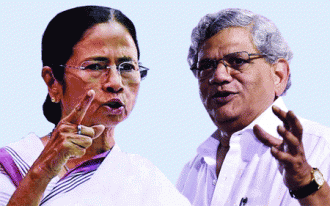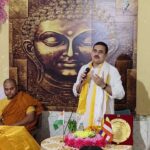WEST BENGAL’S FALSE MESSIAHS
- By : Anirban Ganguly
- Category : Articles

Real poriborton continues to elude this State, and the triumvirate of hunger, fear and corruption, which has ruled the roost for the many past decades, still holds sway. The so-called liberators of the people, the Left and the Trinamool Congress, have roundly failed
Last week, while addressing the Press in Kolkata, BJP president Amit Shah articulated one of the most appropriate descriptions of West Bengal; he said that the State was afflicted and weighed down by fear, hunger and corruption with successive Governments, in the last nearly four decades, only reinforcing these instead of trying to address them. This degenerative triad has in fact been the defining dimensions of West Bengal politics from the 1970s up to the present. Every Government since then the majority of them led by the CPI(M)-led Left Front and in the last five years by that epitome of ‘centralised despotism’ — to borrow an expression from Trinamool Congress Member of Parliament Sugata Bose — the Mamata Banerjee-led Trinamool Congress, has only further shackled the state with these three chains.
Fear and death have been the constants in West Bengal politics ever since the communists assumed charge. Not that the Congress regime before it can be absolved of fear and death-mongering; one needs to recall the alliance that the Congress had struck with Naxals for a while in 1970s in order to liquidate its political adversaries. Once the CPI(M) came to power, it unleashed another round of violence, targeting political opponents, hounding out independent-minded intellectuals and others who did not sing paeans to the ‘people’s revolution’.
It was in three decades of communist rule that violence became endemic to West Bengal polity, a way of life and of politics that was hard to counter and stall. The communists justified, as they have always done, all their actions, especially the violent and inexplicable ones, in the name of the people — much as they are trying to explain away today their opportunistic tie up with the Congress in the name of the people.
Armed gangs of party cadres owing allegiance to the ‘people’ unleashed a cycle of violence against ‘people’ who worked against ‘people’. Thus, in the name of the people, West Bengal developed into one of the most violent States. The Congress cadres — Rahul Gandhi was perhaps too young to recall and hence his confused political stand in the State — bore the brunt of these attacks, their cadres being killed or hounded out of home and hearth in the fight of turf-control or the proverbial communist operation of Elaka dakhol.
Armed and motorbike-borne gangs, known as the Harmads, mushroomed across the State and terrorised the very proletariat in whose name they had sought the people’s mandate. The entire countryside was perpetually beset by fear and violence. Retribution was swift and often bloody for anyone questioning the might and writ of the party.
These armed cadres thrived in their personal businesses as well, often tying up with builders and terrorising people in parting with their properties at throw-away prices. In turn, cadre-promoters built sub-standard edifices on these properties, flouting safety regulations. The Girish Park flyover collapse is symbolic of all the construction ills that both communists and TMC have institutionalised.
The AMRI hospital fire in 2011, where 90 patients died (many of them in the ICU), was a classic example of how the communist party cadres-leaders-builders lobby nexus operated in the State on a solid quid pro quo and violated all regulations to erect infrastructures that were potential coffins and tinder boxes waiting to conflagrate or collapse. Corruption had become endemic too. It had enmeshed itself in the cadre raj that the communists had clamped on West Bengal and which to this day continues under the TMC’s protective mask. Every construction had to be referred to the Party bosses and handled by the cadre-promoter, with the proceeds being shared between the cadres and the Party. The local club had to be propitiated and humoured so that the locality was kept under watch and each independent action by citizens scrutinised, reported, controlled, co-opted or simply stalled. A large army of anti-socials had also to be patronised and protected. One recalls how a particular mafiosi leader patronised by the communist regime and operating in the southern parts of Kolkata, had addressed the then city Police Commissioner by his first name, suffixing it with the Bengali ‘da’, during the funeral of Satyajit Ray in 1992!
Country-made rifles and bombs had become the order of the day and large swathes of rural Bengal were in the grip of these armed militia. The Congress, which had initially resisted such lumpenisation of West Bengal politics, gradually acquiesced while acting as a token opposition. Most of its State leaders had struck a pact with the communists and were allowed to perpetuate their local and locality fiefdoms in various corners of the State undisturbed.
Post-2011, the majority of the mafiosi cadres and lumpens from the Left shifted en masse to the TMC and continued with the same zeal and with similar political protection they had under the comrades. While the Left leaders and Party bosses indulged in corruption through other means, the TMC people have no qualms in openly tendering and cornering. While the Left Front quietly polarised the State’s politics by patronising Islamists, the TMC does it openly by kowtowing before violent Islamists and allowing their bomb-making and radical agendas to flourish openly in the State.
While the Amlasole starvation deaths in West Midnapore in 2004 was a symbol of hunger under the communist regime, the tea garden starvation deaths symbolise the failure of the ‘Ma-mati-manush’ model. In 2007, the National Sample Survey Organisation found that nearly 11 per cent of families in Bengal faced starvation during several months of the year — the highest among any State in India. Tribals faced neglected, the marginalised were further marginalised and the State regime refused to accept its failure or rush relief. While the then ‘communal’ Chief Minister of Gujarat had developed a tradition of visiting the tribal belts of his State every year for personally monitoring the development projects in the area, the proletarian Chief Minister of West Bengal tried to shove these deaths under the carpet with the brush of ideology and bombast. After 27 years of communist rule, Amlasole had only “one well supplying drinking water, while there was no healthcare facility available apart from some mobile medical vans”.
For the 13 last years, neither the communist rule nor the TMC regime was able to prevent starvation deaths in the tea gardens of north Bengal. Both the ideologues of the proletariat and the harbingers of poriborton failed in salvaging the situation. As late as October 2015, starvation deaths in these gardens continued and prompted Mamata Banerjee to knee-jerk in announcing a package, whose implementation still remains suspect.
Real poriborton continues to elude West Bengal, and the triumvirate of hunger, fear and corruption still holds sway. The false messiahs and liberators of the people have roundly failed.

















